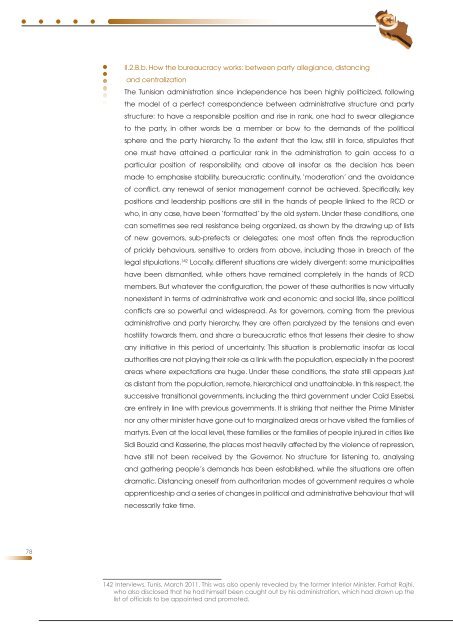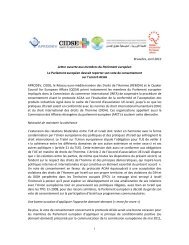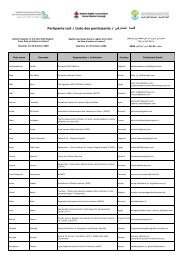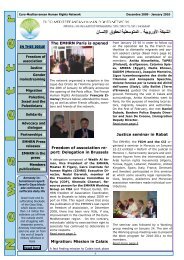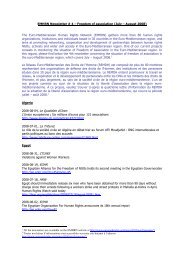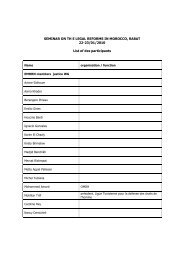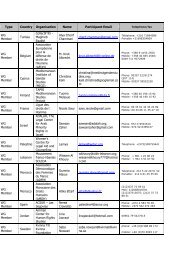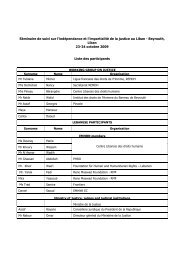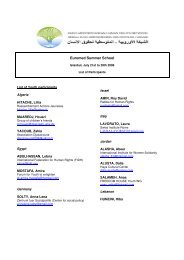tunisia after 14 january and its social and political economy - Refworld
tunisia after 14 january and its social and political economy - Refworld
tunisia after 14 january and its social and political economy - Refworld
Create successful ePaper yourself
Turn your PDF publications into a flip-book with our unique Google optimized e-Paper software.
II.2.B.b. How the bureaucracy works: between party allegiance, distancing<strong>and</strong> centralizationThe Tunisian administration since independence has been highly politicized, followingthe model of a perfect correspondence between administrative structure <strong>and</strong> partystructure: to have a responsible position <strong>and</strong> rise in rank, one had to swear allegianceto the party, in other words be a member or bow to the dem<strong>and</strong>s of the <strong>political</strong>sphere <strong>and</strong> the party hierarchy. To the extent that the law, still in force, stipulates thatone must have attained a particular rank in the administration to gain access to aparticular position of responsibility, <strong>and</strong> above all insofar as the decision has beenmade to emphasise stability, bureaucratic continuity, ‘moderation’ <strong>and</strong> the avoidanceof conflict, any renewal of senior management cannot be achieved. Specifically, keypositions <strong>and</strong> leadership positions are still in the h<strong>and</strong>s of people linked to the RCD orwho, in any case, have been ‘formatted’ by the old system. Under these conditions, onecan sometimes see real resistance being organized, as shown by the drawing up of listsof new governors, sub-prefects or delegates; one most often finds the reproductionof prickly behaviours, sensitive to orders from above, including those in breach of thelegal stipulations. <strong>14</strong>2 Locally, different situations are widely divergent: some municipalitieshave been dismantled, while others have remained completely in the h<strong>and</strong>s of RCDmembers. But whatever the configuration, the power of these authorities is now virtuallynonexistent in terms of administrative work <strong>and</strong> economic <strong>and</strong> <strong>social</strong> life, since <strong>political</strong>conflicts are so powerful <strong>and</strong> widespread. As for governors, coming from the previousadministrative <strong>and</strong> party hierarchy, they are often paralyzed by the tensions <strong>and</strong> evenhostility towards them, <strong>and</strong> share a bureaucratic ethos that lessens their desire to showany initiative in this period of uncertainty. This situation is problematic insofar as localauthorities are not playing their role as a link with the population, especially in the poorestareas where expectations are huge. Under these conditions, the state still appears justas distant from the population, remote, hierarchical <strong>and</strong> unattainable. In this respect, thesuccessive transitional governments, including the third government under Caïd Essebsi,are entirely in line with previous governments. It is striking that neither the Prime Ministernor any other minister have gone out to marginalized areas or have visited the families ofmartyrs. Even at the local level, these families or the families of people injured in cities likeSidi Bouzid <strong>and</strong> Kasserine, the places most heavily affected by the violence of repression,have still not been received by the Governor. No structure for listening to, analysing<strong>and</strong> gathering people’s dem<strong>and</strong>s has been established, while the situations are oftendramatic. Distancing oneself from authoritarian modes of government requires a wholeapprenticeship <strong>and</strong> a series of changes in <strong>political</strong> <strong>and</strong> administrative behaviour that willnecessarily take time.78<strong>14</strong>2 Interviews, Tunis, March 2011. This was also openly revealed by the former Interior Minister, Farhat Rajhi,who also disclosed that he had himself been caught out by his administration, which had drawn up thelist of officials to be appointed <strong>and</strong> promoted.


